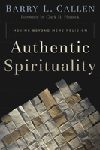Against the prevailing but uninformed notion that “I am spiritual, but not religious,†Barry L. Callen (professor of Christian studies at Anderson University, editor of the Wesleyan Theological Journal and founding editor of Anderson University Press) counters that religion and spirituality must coexist. In this book, Authentic Spirituality: Moving Beyond Mere Religion (Grand Rapids: Baker Academic, 2001. 271 pages. $18.99. ISBN 0-8010-2288-6) he demonstrates how religious practice and tradition are necessary for authentic Christian spirituality.

Callen’s stated purpose is “to show the way beyond dead orthodoxy to the authentic Christian faith of the heart, a faith that is both text anchored and Spirit enlivened†(p. 19). His approach in the principal chapters is to select language (terms) and teachings of the Bible on spirituality, relate them to key elements of the Christian year and them to connect those to the theological teaching of the Apostles Creed. Callen’s audience is primarily the Evangelical Christian who may not be familiar with the traditional liturgy of the Christian Year and the Apostle’s Creed that inform the spirituality of more Mainline traditions. As such, his approach is a bold attempt at reclaiming a richer heritage that can ground contemporary spirituality in Word and tradition.
Callen is a careful scholar and engaging writer, providing solid scholarship in the literature of spirituality, responsible hermeneutics, and a preacher’s knack for storytelling. A strength of the author’s approach is a careful attention to basic definitions of terms and concepts used (spirituality, Christian, religion, prayer, etc.). He relies on the critical works of ancient and modern authors on spirituality for these definitions, providing along the way a valuable introduction to the literature and writers on spirituality from a variety of traditions. Chapter one focuses on foundational issues of personal openness to God and to Christian tradition and heritage, and of God’s openness to us throughout history. Chapters 2 to 7 focus on specific dimensions of the work of the Spirit, and how the resources of tradition, the Church Year, and the Apostle’s Creed can be relevant tools and guides to tapping into the movements of the Spirit for a more authentic spirituality. The final chapter, “Truly Growing: Paths to Sanctification†provides ways and means for working at a maturing, authentic spirituality: Biblical models of spiritual growth, “Exercises, Fruits, and Gifts,†and the spiritual discipline of waiting.
The book provides a sound introduction to Christian spirituality accessible to students and laypersons. The writing style is conversational with numerous illustrations and anecdotes—though often these may seem excessive, interrupting the narrative of the point at hand. The author includes extensive historical and theological background, a glossary, a list of select spiritual leaders, extensive notes, and a bibliography.

